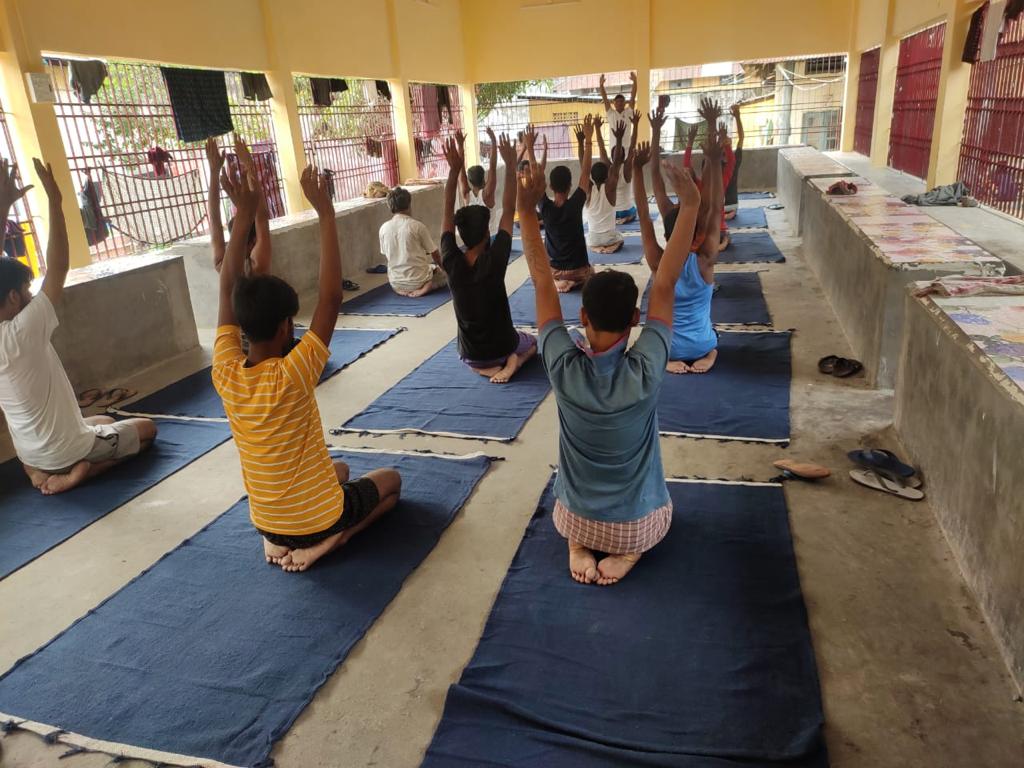In a major step towards rehabilitation and mental well-being, the Centre for Substance Abuse Prevention and Care (CSAPC) has launched a yoga and meditation program for the inmates of Dhubri District Jail in Assam. This initiative aims to address the pressing issue of substance abuse and mental health among inmates, particularly those held under the Narcotic Drugs and Psychotropic Substances (NDPS) Act.
The Launch of the Program
The yoga and meditation program commenced on a Saturday, marking the beginning of a transformative journey for the nearly 200 undertrial prisoners at the Dhubri District Jail. Conducted by the CSAPC, a public charitable trust dedicated to substance abuse prevention and care, the program will be held three times a week. This initiative not only focuses on physical fitness but also emphasizes mental health, which is crucial for individuals facing the challenges of incarceration.
Addressing Substance Abuse Issues
Dhubri district has been identified as a vulnerable area where heroin abuse is alarmingly prevalent. Reports indicate that narcotic substances are easily accessible, even at the village level, contributing to a rising number of substance abuse cases. The CSAPC officials have expressed concerns over the escalating issue, particularly the prevalence of HIV among intravenous drug users in the region. The district’s health infrastructure, including the newly established Dhubri Medical College and Hospital (DMCH), is reportedly ill-equipped to handle the crisis effectively.
Health Risks and Challenges
In addition to narcotic addiction, the spread of HIV and Hepatitis C poses severe health risks in the Dhubri district. Intravenous drug users, who form a significant part of the population affected by substance abuse, are particularly vulnerable to these diseases. Despite the urgent need for treatment and prevention measures, there is currently no Anti-retroviral therapy (ART) center operational at DMCH, and the nodal preventive office for Hepatitis C is almost non-functional.
ART is essential for individuals living with HIV, as it involves a daily combination of medications that help them lead longer, healthier lives. The lack of such facilities in the district exacerbates the problem, leaving many without access to necessary treatments.
The Role of Yoga and Meditation
The introduction of yoga and meditation into the lives of inmates is a holistic approach aimed at not only addressing physical fitness but also fostering mental well-being. The CSAPC officials are optimistic that this initiative will bring about a major change in the lives of those struggling with addiction. Yoga and meditation are known for their benefits in reducing stress, improving mental clarity, and promoting emotional stability.
Through regular practice, inmates can learn coping mechanisms to deal with the challenges they face, both inside and outside the prison walls. The program aims to instill a sense of discipline and mindfulness, which can play a crucial role in their rehabilitation process.
Future Interventions and Support
Following the yoga and meditation sessions, the CSAPC plans to implement additional interventions tailored to the specific needs of the inmates. These may include counseling sessions, support groups, and educational programs that focus on substance abuse prevention and healthy lifestyle choices.
The overarching goal is to empower inmates with the knowledge and skills necessary to make informed decisions about their health and well-being. By addressing the root causes of addiction and providing support, the program seeks to facilitate the reintegration of these individuals into society as healthier, more productive members.
Community and Health Sector Involvement
The successful implementation of this program will require collaboration between various stakeholders, including health professionals, social workers, and community organizations. The CSAPC has expressed the need for an urgent review of the district’s health infrastructure to adequately respond to the pressing health issues related to substance abuse.
The involvement of local communities and organizations can play a vital role in raising awareness and providing support for those affected by addiction. By fostering a culture of understanding and compassion, communities can help combat the stigma surrounding substance abuse and promote recovery.
The initiation of the yoga and meditation program for inmates at Dhubri District Jail marks a positive step towards addressing the complex issues of substance abuse and mental health in Assam. While challenges remain, the concerted efforts of the CSAPC and local authorities offer hope for a brighter future for individuals struggling with addiction. Through comprehensive support, rehabilitation programs, and enhanced health services, there is potential for major change in the lives of those affected by substance abuse in Dhubri and beyond.

